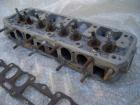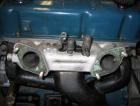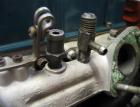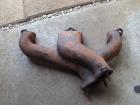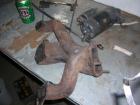| Revision as of 04:34, 1 November 2009 ddgonzal (Talk | contribs) (->Rocker Cover) <- Previous diff |
Revision as of 04:36, 1 November 2009 ddgonzal (Talk | contribs) (->Engine Block) Next diff -> |
||
| Line 62: | Line 62: | ||
| * Balanced crank(?) Standard A12 crank is also balanced | * Balanced crank(?) Standard A12 crank is also balanced | ||
| * [[Piston|Pistons]]: Flat top pistons for 10:1 compression ratio on hi-gas models | * [[Piston|Pistons]]: Flat top pistons for 10:1 compression ratio on hi-gas models | ||
| - | ** NOTE: some GX engines have standard 9.5:1 dished pistons | + | ** These are same as Datsun 1000 coupe (A10 engine) and Nissan Cherry A10 pistons (same part number) |
| + | ** NOTE: some GX engines have standard A12 9.5:1 dished pistons | ||
| * [[Camshaft]]: Slightly longer duration cam than stock 1200, for 6800 RPM usage (up 400 RPM over stock cam) | * [[Camshaft]]: Slightly longer duration cam than stock 1200, for 6800 RPM usage (up 400 RPM over stock cam) | ||
| * [[Water pump]] inlet pipe at front of block (PIPE-suction, water pump) has an additional hose fitting for the manifold coolant hose. | * [[Water pump]] inlet pipe at front of block (PIPE-suction, water pump) has an additional hose fitting for the manifold coolant hose. | ||
Revision as of 04:36, 1 November 2009
The Datsun A12GX Engine is legendary. While it may not be a powerful as an A14 engine, it was a stock package offered in Japanese Domestic Model Datsun 1200 GX Sedans and Coupes and was rated at 20% more horsepower than the Standard A12 engine. The GX engine featured a matched pair of Hitachi HJE38W carburetors, larger cam, giant intake ports, and streamlined exhaust for superior high-RPM power.
Also see: Hitachi Twin Carb
Contents |
Performance
| A12 | 69 horsepower | Single carb | Datsun B110 |
| A12T | 80 horsepower | Twin carb | Nissan Cherry E10 |
| A12GX | 83 horsepower | Twin carb | Datsun B110 |
| A14 | 85 horsepower | Twin carb | Datsun B210 |
GX Cylinder Head
The GX cylinder head has the largest ports of any factory A-series cylinder head. The ports are larger than A14/A15 ovals. This makes it suitable for extra-high RPM usage. However, the valves are standard A12 size, smaller than A14/A15 valves. The latter is a better head for regular-RPM usage (under 4000 RPM).
Main article: A-series_Cylinder_Heads
- GX has intake ports shaped differently for flow and swirl, however it is said that a ported and polished standard A12 head with larger valves fitted flows about the same as a standard GX head. Also see head trivia.
- The GX head bolts on an A14/A15, but is very similar to the oval port A15 head. However, the 1974-up heads provided oil to the rocker shafts in different locations so you may need to drill the oil passage in the newer block
- There is apparently an A14 Oval Port GX head which flows more than the A12GX head.
reference: GX Head or A15 - GX head uses standard A12 size valves. No bigger than stock. The Nissan A14 Competition head was used by Nissan for racing is similar but has the larger A14-size valves.
- GX fuel pumps have a slightly stronger spring under the diaphram to boost fuel delivery pressure a smidgen.
- A12T (twin carb) cylinder head from Nissan Cherry has a different part number but seems identical
Identification
To be a genuine GX head, it must have these features:
- Extra-large oval ports 30x35 mm (larger than A14/A15 28x34 mm)
- Four large-diameter water holes (5-6mm), one below each port (regular engines have three small-diameter, or none at all). These send coolant to the water-heated GX inlet manifold.
- Heart shaped combustion chambers
- Extra hole drilled for rocker oiling
- Valves: 35mm inlet, 29mm exhaust (smaller than A14/A15)
- Combustion chamber: 29.1 cc (as per FIA papers)
CAUTION: Some A12T heads also have the same features. How to tell the difference between Cherry Coupe (E10) A12T engine and A12 GX engine? Unknown. See discussion'Virgin Pone'.
Also note:
- 1200 GX heads usually (always?) have no casting numbers at all
- A genuine head may have had the dual-valve springs removed. But it will probably still have the dual-step valve spring seats
Engine Block
The GX engine block is a standard A12 part. However, it carries a different Part Number because it has some extra parts attached to it:
- Balanced crank(?) Standard A12 crank is also balanced
- Pistons: Flat top pistons for 10:1 compression ratio on hi-gas models
- These are same as Datsun 1000 coupe (A10 engine) and Nissan Cherry A10 pistons (same part number)
- NOTE: some GX engines have standard A12 9.5:1 dished pistons
- Camshaft: Slightly longer duration cam than stock 1200, for 6800 RPM usage (up 400 RPM over stock cam)
- Water pump inlet pipe at front of block (PIPE-suction, water pump) has an additional hose fitting for the manifold coolant hose.
The block crank and rods are the same as the standard A12.
Block Ventilation
The GX engine has a reverse flow block ventilation system, compare with the standard A12 engine. In the GX, the block breather hose goes to the air cleaner, while the rocker cover hose goes to the air cleaner.
Induction
The GX engine uses a twin-carb inlet manifold with extra-large oval ports to match the cylinder head.
See main article: Hitachi Twin Carb
Features include:
- a matched pair of left- and right- hand Hitachi HJE38W carbs. These are variable venturi (SU-type), with 38mm bore (~1.5 inches)'
- Oval port inlet manifold with water jackets to match up with th water hoes in the cylinder head
- Intake manifold has 2 studs at the top of each pair of inlet ports (cylinder head matches this). Standard A12 has only one stud per pair of intake ports.
- Manifold has provision for PCV valve:
- It is reported that SU carburetors (H4 or HS4 1.5 inch carbs) will fit the GX manifold, with some linkage creativity.
- The GX manifolds will fit an A14/A15 engine but port mismatch occurs
- Fitting A14T manifold to A12 GX head will likely result in leaks since the GX head ports are higher up than the manifold ports.
Carburetors
The left-hand and right-hand Hitachi 38mm carburetors have a unique center linkage. They are 'dome-top' Hitachis, not the 'flat-top' models used in newer models like the B210.
- The L-series twin-Hitachi engine linkage reportedly does not fit.
There is a stamped aluminum heat shield. The carb throttle return springs connect to a stamped hook on this heat shield.
Choke Linkage
18410-H2302 WIRE COMP,-choke control GX
The A12GX used a twin-cable Choke knob. However, you can use the stock single cable with a simple bracket on the carbs to operate both:
Air Cleaner
Exhaust
The GX engine has a dual-outlet cast exhaust manifold that bolts to twin head pipes which blend into into one pipe further down.
See main article: Exhaust Piping
Compared to Extractors
Word has it that the GX exmani works as good as common extractors (headers), though not as good as the best tuned-length extractors. The factory 1200/B110 Competition Tune-up manual recomends the GX manifold for Rally competition use instead of extractors.
NOTE: Many Datsun 1200 extractors may not clear the GX inlet manifold.
Rocker Cover
The Rocker cover is unique to the A12GX engine:

- accelerator clip is on front pad, not rear
- fuel line clip boss is on rear left side, not front left side
- Datsun logo (not Nissan)

Arrows: Accelerator cable clip
- GX: center feed accelerator cable
- A12: rear feed accelerator cable
Circles: Left side threaded boss for fuel line
- GX: rear boss
- A12: front and rear bosses
NOTE: A12T in Nissan Cherry has a unique rocker cover that is different from A12GX or standard A12. Anyone have a picture?
Specifications
- Nominal Rev Limit: 6800 RPM (instead of standard A12 6400 RPM)
- Actual Rev limit: reported fine at 8,000, float at 8,150 rpm
references:
- FIA Amendment March 1970
Datsun 1200 group 1 FIA recognition
| part | A12GX Engine | A12 Engine |
| Carb | Hitachi HJE38W side-draft (two carbs) | Carb Hitachi DCG306-1 down-draft |
| Carb Venturi | Variable | Primary: 26 mm, Secondary: 30mm |
| compression ration | 10.0 | 9.5:1 |
| combustion chamber | 29.1 cm3 | 36.6 cm3 or 29.1 cm3 |
| valve opens | BTDC 20 degrees +- 7 degrees | ? |
| valve closes | ABDC 56 degrees +- 7 degrees | ? |
| valve opens | BBDC 58 degrees +- 7 degrees | ? |
| valve closes | ATDC 18 degrees +- 7 degrees | ? |
| In. Valve dia. | 29 mm 1.14 in | ? |
| valve lift | 9 mm 0.35 in | ? |
| exhaust ports | 27w x 29h +- 1.5 mm | ? |
| intake ports | 30 mm circle with 4.5 mm elongated section (30 x 34.5 oval?) | ? |
| exhaust ports | 26w x 28h with 3 mm radius +- 1.5 mm | ? |
| center ex port | 69w x 28h | ? |
| intake ports | 28/27 mm circle | ? |
| Flywheel weight | ? | 9.5 kg |
| Flywheel with all turning parts | ? | 13.1 kg |
| hp | 83ps @ 6,400 rpm | hp 68ps JIS @ 6,000 rpm |
| max rpm | 6,800 rpm (80 ps) | hp 68ps JIS @ 6,000 rpm |
| max torque | 10.0 kg-m at 4,400 rpm | 9.7 kg-m at 3,600 rpm |
| max speed car | 160 km/hour | 150 km/hour |
B210 A12 'GX' Engine
The B210 A12 twin-carb engine was designated A12T by Nissan. It was basically the same as the B110 twin carb (1200 GX Engine), but based on the newer cylinder block. The head was no longer drilled for the oil gallery that was unique to the A10 & 1200. It also used flat top carbs and the inlet manifold had provision for a few more fittings to allow compliance with newer smog laws. There was also provision for a vacuum takeoff for the brake booster.
See main article: Hitachi Twin Carb
The B210 A12T induction seems to be the most commonly encountered twin-carb A-engine setup in Australia.
The B210 A12T exhaust manifold was the same as the GX one, but the fuel pump was of course the newer type for the new cylinder block.
The air filter housing base plate was revised a little to accomodate more fittings too, but the main cover piece was unchanged, other than for the change in colour from red to blue. It seems that L series SSS air filters also went from red to orange.
A14 and A15 'GX' Engine
Datsun Competition referred to an A14 'GX' cylinder head, however, this appeared to to be a late A12T head fitted with the larger A14/A15 valves. This would be the best A-series cylinder head but was not factory offering, but a racing/competition offering.
Part Numbers
See main article: A12GX Part Numbers


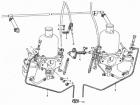



![[Datsun 1200 encyclopedia]](/wiki/upload/wiki.png)







